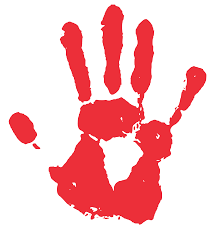
Image via Wikimedia Commons: https://commons.wikimedia.org/wiki/File:Red_hand.svg
Nimiipuu Mole Julian Ankney hosts this show featuring audio excerpts from an April conference on “Native Sovereignty, Decolonization, Divestment, Reparations, and Environmental Justice,” sponsored by Washington State University Vancouver Native Programs and the Collective for Social and Environmental Justice, and co-sponsored by PSU Indigenous Nations Studies. Segments from the conference include:
Missing and Murdered Indigenous People, Fossil Fuels, Man Camps, and a Case for Divestment, Reinvestment, and Reparations: The sexual exploitation, torture and disappearance of Native Americans has deep historical roots, beginning in 1492. In some parts of the country, Native women experience rates of murder ten times higher than the national average. Rates of violence spike with the introduction of fossil fuel “man camps” with the introduction of transient workers in an industry rooted in the exploitation and commodification of Indigenous people and lands. A panel discussion featuring Celilo Wy’am activist Lana Jack, WSU MA student Shuvro Das, Kristin Edmark with Divest Washington, and Stevie Fawcett a WSU undergrad and organizer with Fossil Free WSU.
Speaking to the Gap: Health Disparities and Mortality in Indian Country: Historical and ongoing patterns of colonial violence, racism, and the exploitation of Indigenous lands and peoples translate into a host of health disparities, including higher rates of infant and maternal mortality and lowered life expectancy for American Indians in Oregon. Covid has only exacerbated the situation, constraining access to health care. Featuring Danica Brown, M.S.W, Ph.D., Choctaw of the Watonlak Oshi “White Crane'' clan, Behavioral Health Programs Director, Northwest Portland Area Indian Health Board; Melanie Henshaw, Muscogee (Creek), Indigenous Affairs Reporter for Street Roots; and Stephen Fawcett, WSU student in Microbiology; with facilitation by Meagan Lobnitz, Associate Professor of English, WSU Vancouver
Centering Culture in Climate Resilience: An attack on our homelands and waterways is an assault on our sovereignty, tribal treaty rights, fishing rights and human rights to flourish and thrive and cultivate our natural foods like the salmon. Indigenous people are rooted in the ways of the natural world here in the PNW and elsewhere, and cultural knowledges that instruct us on how to be in reciprocity with the land also provide pathways to healing from drugs, alcohol, and medical disparities. Featuring Michele Pinkham, Two-Spirit, Nimiipuu, Development and Community Engagement Manager, NARA NW; and Christy da Rosa, Social Work PhD student and research assistant, Trauma Informed Oregon, and moderated by Lakota-Cheyenne Mole and activist Roben White.
- KBOO

